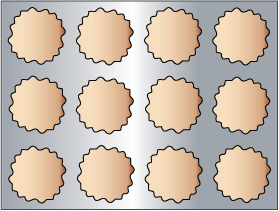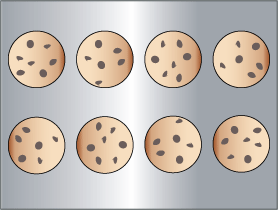Copyright © University of Cambridge. All rights reserved.
'Lots of Biscuits!' printed from https://nrich.maths.org/
Show menu
Why do this problem?
This activity is an opportunity for young children to solve a practical problem that involves sharing into groups of two and five, and even six. By introducing the problem within the context of baking, children might surprise you with the level of mathematics they can handle. Having high expectations of learners is a key attitude and this challenge allows children to work at their own level. Some might be keen to discuss cutting up biscuits, whereas others might be happy to have some 'left over', or some for another day, for example. You may be able to bake biscuits with the children so that they have the 'real thing', alternatively you could make salt dough cookies or cookies out of plasticene/play dough. Or, you could simply introduce the context as a story and allow the children to create their own representations.
Possible approach
You could read the book 'The Doorbell Rang' by Pat Hutchins before tackling this problem.
The problem might be best done with a small group of children so that the story about William's group and Miss King can be told gradually. At each question, give plenty of time for the pupils to try to solve it. You might encourage them to work all together, or in pairs, depending on how many you have in the group. You can spend time talking about their solutions as a whole group before
continuing with the story.
As the children talk together, you have the opportunity to observe and assess. How are they approaching the task? Do they make the biscuits and physically share them? Are they happy to use something else to represent the biscuits? Perhaps they choose to draw a picture or jot things down to help? Are any of them able to use appropriate mathematical symbols to represent what they are doing? It
is important that all their ideas are valued so you give them confidence to 'have a go' rather than worry about the method that they think you want to see.
When it comes to sharing eight biscuits between three children, allow learners to come to their own decisions regarding the possibility of cutting biscuits. Again, this is a good opportunity to assess their understanding of sharing 'equally' or 'fairly' and possibly fractions.
Key questions
How do we know how many biscuits there are?
What could we do to share out the biscuits fairly?
Tell me about what you're doing.


